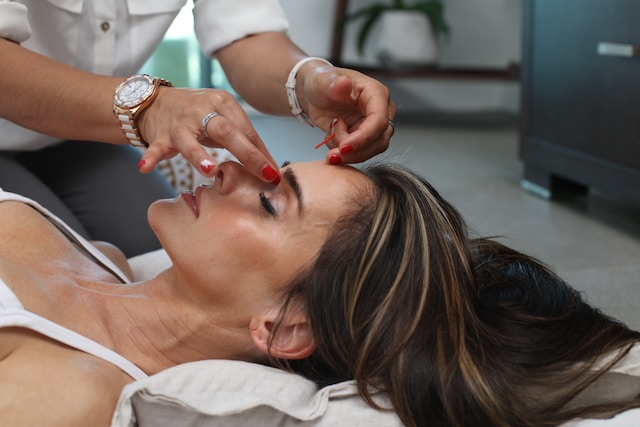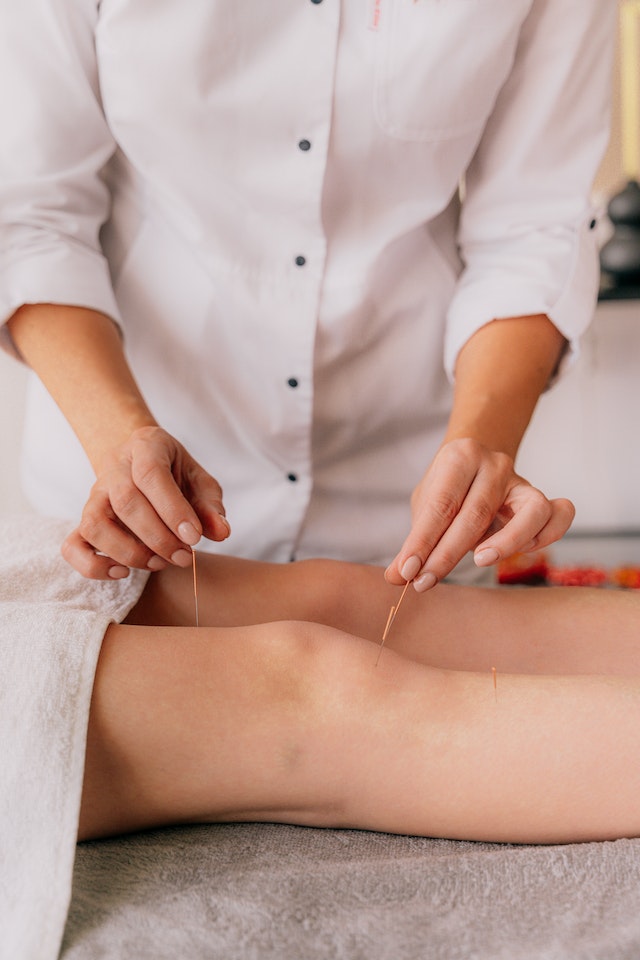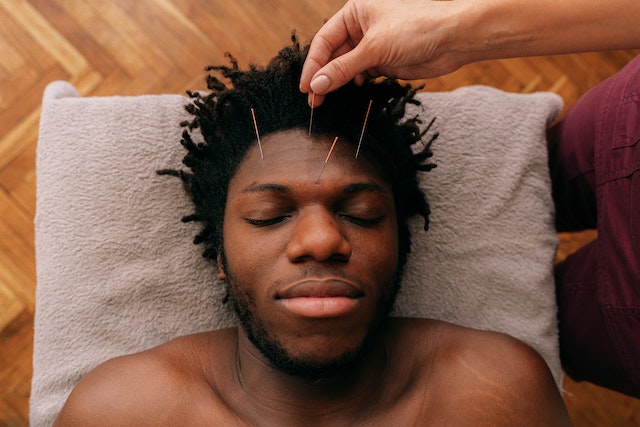
Acupuncture represents a profound connection between various realms of our being. At its core, acupuncture is a therapeutic modality rooted in Traditional Chinese Medicine (TCM) that aims to restore balance and promote the body’s innate ability to heal itself. Through the delicate art of needle insertion into specific points along the body’s meridians, practitioners of this alternative medicine tap into a vast reservoir of energy, nurturing the body, mind, and spirit in perfect synchrony.
How Acupuncture Works
At the heart of acupuncture lies the intricate network of meridians, which flow throughout the body like rivers of energy. These meridians serve as the highways through which Qi, the vital life force, travels. Each meridian is associated with specific organs and functions, forming a comprehensive map of the body’s energetic landscape.
The Harmony of Yin and Yang
Central to the philosophy of Traditional Chinese Medicine is the concept of Yin and Yang – the eternal dance of opposing forces that exist within all aspects of life. Yin represents the passive, nurturing, and feminine energy, while Yang embodies the active, asserting, and masculine energy. In a balanced state, Yin and Yang harmonize, promoting optimal health and well-being. However, when there is an imbalance, disharmony arises, leading to various ailments and discomfort.
Unlocking Energy Blockages
Acupuncture’s primary goal is to identify and alleviate the blockages or imbalances in the flow of Qi, thus restoring harmony within the body. Through gentle insertion of hair-thin needles into specific acupuncture points, skilled practitioners can stimulate or sedate the energy, rebalancing any disruptions and promoting the free flow of Qi. This intricate dance of insertion and stimulation redirects the body’s energy, allowing it to regain its natural state of equilibrium.
Enhancing Vitality and Wellness

Beyond simply addressing physical ailments, acupuncture is known for its holistic approach. By stimulating specific acupuncture points, practitioners are able to promote not only physical healing but also emotional and spiritual well-being. Studies have shown that acupuncture can alleviate stress, reduce anxiety, and enhance overall vitality, leaving individuals feeling rejuvenated and harmonized.
From its roots in ancient China to its transformative power in modern society, acupuncture continues to captivate hearts and minds with its elegance. Like a skilled artist wielding a delicate brush, acupuncturists navigate the intricate pathways of the body, tapping into its innate healing abilities. This ancient practice reminds us of the seamless connection between our physical bodies and our inner realms, inviting us to embark on a journey of self-discovery and renewal.
Benefits of Acupuncture
Through the delicate art of needle insertion, acupuncture stimulates the body’s natural healing abilities, leading to unparalleled benefits that resonate deeply within. Let us explore the extraordinary benefits of acupuncture and witness the remarkable transformations it can bring to our lives.
Pain Relief
- Acupuncture has been widely recognized for its remarkable ability to alleviate various types of pain, including headaches, back pain, neck pain, and joint pain.
- By stimulating acupuncture points, the body releases endorphins, natural pain-relieving chemicals, providing long-lasting relief without the potential side effects of medication.
Stress Reduction:
- In today’s fast-paced world, stress has become a prevalent and often debilitating condition. Acupuncture offers a sanctuary of tranquility, providing deep relaxation and alleviating stress-related symptoms.
- Regular acupuncture sessions can help regulate the body’s response to stress, leading to improved mental clarity, increased energy levels, and enhanced overall well-being.
Enhanced Mental Health:
- Acupuncture not only addresses physical ailments but also supports and nurtures mental and emotional health.
- Studies suggest that acupuncture can effectively reduce symptoms of anxiety, depression, and insomnia, promoting a sense of calm and emotional balance.
Boosts Immune System:
- Acupuncture stimulates the body’s natural defense system, strengthening the immune response and promoting overall vitality and resilience.
- By optimizing the flow of Qi, acupuncture helps restore the body’s natural equilibrium, enhancing its ability to fend off illnesses and maintain optimal health.

Improved Digestive Health:
- Digestive disorders such as indigestion, acid reflux, bloating, and irritable bowel syndrome (IBS) can be effectively addressed through acupuncture.
- By improving the flow of Qi within the digestive system, acupuncture can relieve discomfort, regulate bowel movements, and restore the body’s natural digestive function.
Fertility Support:
- Acupuncture has gained recognition as a complementary therapy for couples struggling with fertility concerns.
- By improving blood circulation to the reproductive organs, balancing hormones, and reducing stress, acupuncture can enhance fertility for both men and women.
Increased Energy and Vitality:
- In a world where fatigue and depletion have become commonplace, acupuncture brings forth a renewed sense of energy and vitality.
- By unblocking stagnant energy and harmonizing the body’s systems, acupuncture ignites the spark of life, leaving individuals feeling rejuvenated and revitalized.
The Acupuncture Process
Step 1: Initial Consultation and Assessment
The journey into the world of acupuncture begins with an initial consultation and assessment conducted by a skilled practitioner. During this time, the practitioner will take the time to truly understand your unique story, medical history, and the specific concerns you wish to address. By carefully listening and asking insightful questions, the practitioner gains a deeper understanding of your physical, emotional, and spiritual well-being, enabling them to tailor the acupuncture treatment to your individual needs.

Step 2: Diagnosis and Treatment Plan
Drawing upon the wisdom of Traditional Chinese Medicine, the practitioner will conduct a thorough diagnosis, which involves observing the subtle cues present in your body, such as the color and texture of your skin, the state of your pulse, and the appearance of your tongue. This comprehensive evaluation helps the practitioner to identify any imbalances or blockages in the flow of Qi, determining the underlying cause of your concerns.
Based on this diagnosis, the practitioner will carefully craft a personalized treatment plan tailored to your unique needs. This plan may involve regular acupuncture sessions, recommendations for lifestyle modifications, and suggestions for herbal remedies or dietary adjustments. By addressing the root causes of your ailments, rather than merely alleviating symptoms, acupuncture offers a holistic approach to healing, fostering long-term well-being.
Step 3: The Acupuncture Session
Now comes the moment of tranquility and rejuvenation – the acupuncture session itself. The practitioner will create a serene and soothing space, helping you feel at ease and fully present in the moment. You will be comfortably positioned on a treatment table, and the practitioner will begin the delicate art of needle insertion.
Using sterile, hair-thin needles, the practitioner will gently and skillfully insert them into specific acupuncture points along the meridians related to your concerns. The needles are typically painless, and you may feel a subtle sensation of warmth, tingling, or even a gentle flow of energy. The needles remain in place for a period of time determined by the practitioner, allowing you to relax deeply and fully embrace the healing process.
Step 4: Rejuvenation and Reflection
As the acupuncture session progresses, you may experience a deep sense of relaxation and tranquility. The body’s self-healing mechanisms are triggered, and the flow of Qi is restored, cultivating a deep sense of balance and harmony. During this time, it is common to enter a state of profound stillness, where introspection and self-reflection flourish.
As the session draws to a close, the practitioner will gently remove the needles. Take a few moments to rest and allow the experience to settle within you. Many individuals report feeling a renewed sense of vitality, clarity, and well-being following an acupuncture session.
Step 5: Integration and Follow-Up Care

Acupuncture is a journey, and the integration of its benefits into your daily life is essential for long-term well-being. Your practitioner may provide recommendations for self-care practices, such as meditation, breathing exercises, or gentle movement, to support the healing process between sessions.
Regular follow-up appointments will be scheduled to monitor progress, make any necessary adjustments to the treatment plan, and further accelerate your healing journey. Acupuncture recognizes the interconnectedness of all aspects of your being, and by embracing this holistic approach, you can cultivate a life of vibrancy, balance, and harmony.
Acupuncture stands as a timeless testament to the wisdom and ingenuity of ancient civilizations. Rooted in a delicate balance between science and spirituality, this extraordinary practice offers us a glimpse into the intricate web of our being, guiding us towards a harmonious existence. Through the gentle art of needle insertion, acupuncture unlocks the body’s innate ability to heal, offering solace and transformation on physical, emotional, and spiritual levels.
